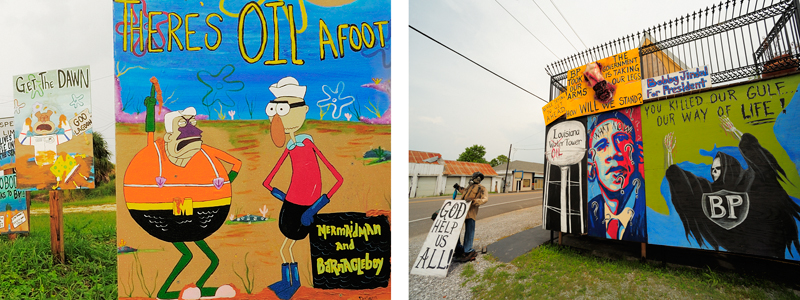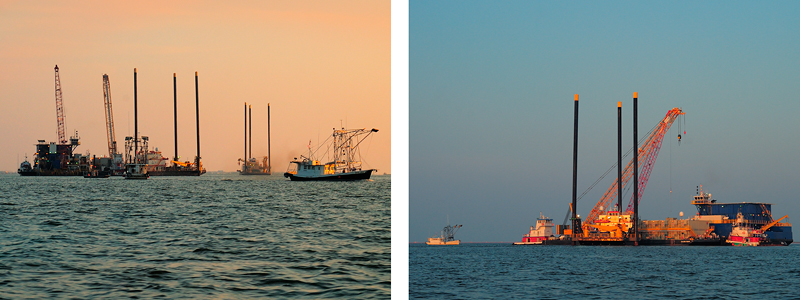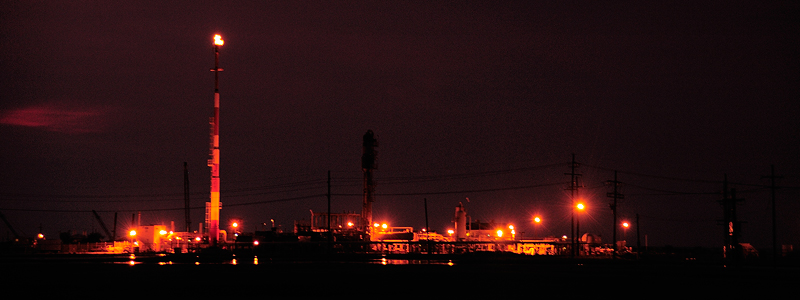

BP Oil Spill Part III – Aftermath
Nov 2010
By: Laura Crawford Williams

How Do Locals Feel: Fear, Anger, Disappointment, and Desperation:
Locals in both locations remain angry and afraid. They’re watching the continued decline of BP equipment and personnel and they are worried. The scale back began with each threat of a tropical storm in the 2010 hurricane season. BP implemented multiple mandatory evacuations, but not all of the evacuated resources were sent back each time. Some locals estimate that about half of the boats working in the “Vessels of Opportunity” program were let go during and soon after my visit in August. It seems clear that as media attention faded, BP methodically reduced the number of workers in all areas. They provided locals with a very good means for alternative income while the cleanup effort was still strong, but now that they have closed down so much of the operation locals are worried, what about next year? Many commercial fishermen have and are declaring bankruptcy because no one will buy Gulf seafood. There aren’t as many sport fishermen returning to these waters, so local charter boat companies are struggling as well. Many oyster beds were killed and it is uncertain if they will rejuvenate for next year’s harvest. In the beginning of the season, shrimp and crab captains were working for BP. Now that they have returned to the water, the amount of contaminated seafood is climbing. The beginning of crab season looked good, but now there are an increasing number of oiled blue crabs. The oil isn’t only covering the outer shells, it’s saturating the gills inside their bodies.
Conclusion: In My Opinion…
I’m left with more questions than answers. For most of these issues, only time will reveal the truth and, even then, there will be contradictory conclusions that continue to confuse and frustrate those of us still interested in the outcome. In my opinion, dispersing the oil with Corexit was BP’s answer to a bigger problem: “How quickly can we make them forget about it?” It seems obvious to me that they are counting on people to dismiss what they can’t see. This has to be the reason they chose to use so much dispersant as early as they did. Why wasn’t more skimming employed before introducing large amounts of a toxic chemical with so many unknowns? Why was such a controversial chemical used when it had already been banned from use in England?

We’ve always known where the missing 26 percent of oil could be found: in the water column. It is mixed with 1.84 million gallons of Corexit dispersant creating 2.37 million gallons of toxic oil/dispersant soup waiting to be evaporated, ingested, stirred up or washed inland. When the oil was on top, it looked menacing and unbelievable, but I feel that the situation now is far more disastrous.

Business is war, especially big business. We all know it’s about who gets to keep power and money. The entire corporation will not be sacrificed in the name of what is right. They did only what they had to and then crept out of the boardroom as soon as media attention was drawn elsewhere. In the end, medical lawsuits will be paid off, scientists’ studies will be contested, bi-partisan politicians will point their fingers, and all remaining problems will be minimized. Meanwhile, BP will list all the great and honorable things they did do, as if every action were a gift instead of their responsibility.
Afterward
As I was writing this, my brother sent me an update describing an increasingly sad situation. BP let my brother go in October and they continue to remove workers as oil, tar balls, and paraffin-like dispersant are deposited daily on beaches and in marshes. High tides are still bringing oil and dispersant far into the center of wetlands where it is pooling in areas used by millions of migrating ducks each winter. Marsh grasses are dying and birds of all species continue to hunt, bathe, float, walk, and roost in dispersed oil. Dig a foot below the surface of the beach and oil still bubbles up from below. There have been more fish kills and more of the seafood is showing up with oil related problems. I hope the Swedish scientists are right, that in 5 years it will all seem like a bad dream. I’d like to remain optimistic, but that becomes more difficult with each passing day and with each person no longer working to clean up the Gulf. I am asking each reader, please don’t forget southern Louisiana, again. Stay informed and don’t buy into corporate schemes.

